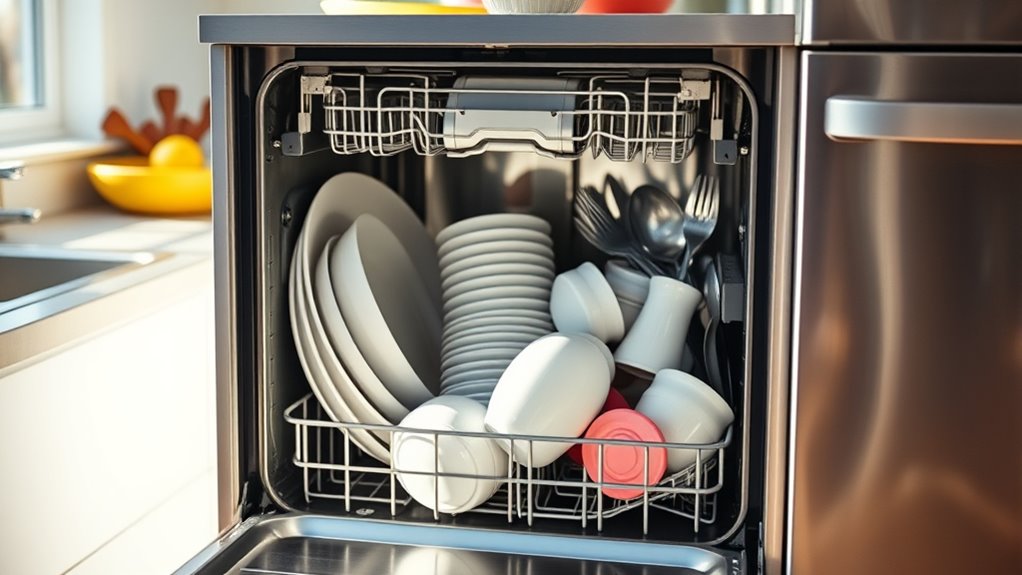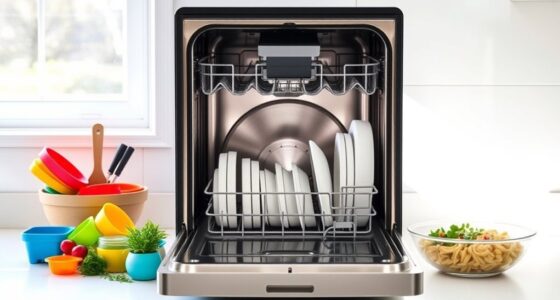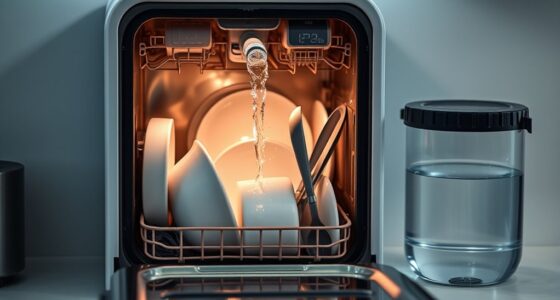Make sure you don’t overload your portable dishwasher or load dishes improperly, as this blocks water flow and reduces cleaning quality. Use the correct detergent and rinse dishes beforehand to prevent residue and clogs. Regularly clean filters, spray arms, and seals to avoid blockages and leaks. Check water temperature, drainage, and cycle settings to verify efficiency. Avoid common mistakes, and you’ll keep your dishwasher running smoothly—stay with us to discover how to master these tips perfectly.
Key Takeaways
- Overloading or improper loading blocks water flow, reducing cleaning effectiveness and causing spots or residue.
- Running the dishwasher with partial loads wastes water, energy, and detergent, lowering efficiency.
- Not rinsing dishes beforehand leads to clogging spray arms and poor cleaning results.
- Neglecting regular maintenance like cleaning filters and spray arms causes clogs and decreased performance.
- Using incorrect water temperature or damaged seals can compromise cleaning and cause leaks.
Overloading the Dishwasher

Overloading a portable dishwasher can prevent it from cleaning effectively. When packing the dishwasher racks, avoid cramming dishes too tightly or stacking them unevenly. Proper loading patterns ensure water and detergent reach all surfaces. Place larger items like pots and pans on the bottom rack, keeping them spaced out to prevent blocking spray arms. Use the top rack for cups, glasses, and smaller utensils, making sure they don’t nest or overlap. Leave enough space between dishes so water can circulate freely. Overloading causes water pressure to drop and leaves spots or residue. Always follow the dishwasher’s capacity guidelines, and arrange your items to maximize exposure to cleaning jets. Taking care to load dishes correctly can significantly improve cleaning results. This simple step guarantees cleaner dishes and extends your dishwasher’s lifespan.
Using the Wrong Detergent

Using the wrong detergent can undermine your efforts to get spotless dishes, even if you load your dishwasher correctly. Choosing the right detergent selection is vital because not all cleaning agents work well in portable dishwashers. Some detergents are designed for standard dishwashers and may contain harsh chemicals that damage your machine or leave residues on your dishes. Conversely, using soap intended for handwashing or dish soap can cause excessive suds, leading to poor cleaning and potential leaks. Always opt for detergents specifically formulated for dishwashers, whether powders, gels, or tablets. Reading labels ensures you select a cleaning agent that’s safe and effective. Proper detergent choice helps prevent streaks, residue, and mechanical issues, guaranteeing your dishwasher performs at its best. Additionally, understanding the dispenser mechanism can help ensure the detergent is released correctly during the wash cycle.
Neglecting Regular Cleaning and Maintenance

If you neglect regular cleaning and maintenance, your dishwasher won’t work as efficiently or last as long. Skipping descaling routines can cause mineral buildup, while ignoring filter checks lets debris clog the system. Both mistakes can lead to poor cleaning results and costly repairs over time. Additionally, failing to monitor for proper color accuracy can diminish performance and cause inaccurate cleaning indicators.
Skipping Descaling Routines
Neglecting to regularly descale your portable dishwasher can lead to buildup that hampers its performance. Hard water, especially in areas with high water hardness, causes mineral deposits that reduce cleaning efficiency. To avoid this, keep an eye on your cleaning frequency and schedule descaling routines accordingly. Additionally, using the right descaling products can be crucial, especially in regions with hard water minerals, to prevent long-term damage to the appliance.
Here are three key points to remember:
- Failing to descale allows mineral buildup, decreasing water flow and cleaning power.
- In areas with hard water, descale more often to prevent clogging and odors.
- Regular descaling prolongs your dishwasher’s lifespan and maintains ideal performance.
Skipping descaling routines might seem minor, but it considerably impacts how well your dishwasher cleans. Make descaling a priority based on your water hardness and usage.
Forgetting Filter Checks
Regularly checking and cleaning your dishwasher’s filter is vital to keep it running efficiently. Neglecting filter cleaning can lead to clogs, poor drainage, and reduced cleaning performance. Make it a point to include filter checks in your maintenance checklist to prevent buildup of food particles and debris. A dirty filter forces your dishwasher to work harder, increasing energy use and risking damage. Remove the filter periodically, rinse it under warm water, and scrub away any stubborn grime. Doing so guarantees ideal water flow and prevents unpleasant odors. Incorporating these simple steps into your routine can prevent damage and extend the lifespan of your portable dishwasher. Staying on top of filter maintenance is quick, easy, and indispensable for consistent, effective cleaning.
Not Rinsing Dishes Before Loading

If you skip rinsing dishes before loading, leftover food can cause residue buildup and make your dishes come out dirty again. This also risks clogging spray arms, which affects cleaning performance. Taking a moment to rinse can prevent these issues and keep your dishwasher running smoothly. Additionally, proper rinsing helps prevent clogged spray arms and maintains optimal water flow for better cleaning results.
Residue Buildup Risks
When you load dishes into a portable dishwasher without rinsing off food scraps, residue can quickly accumulate on the dishwasher’s interior and filter. This buildup can cause soap scum, chemical residues, and mineral deposits to stick, reducing cleaning efficiency and leading to foul odors. To avoid these issues, keep in mind:
- Failing to rinse dishes can cause chemical residues to linger, impacting future washes.
- Mineral deposits from hard water can settle on heating elements and filters, impairing performance.
- Excess food debris can clog filters, increasing the risk of residue buildup and damage.
- Automation in business technologies can help monitor and optimize cleaning cycles to prevent residue buildup.
Regularly rinsing your dishes helps prevent these problems, ensuring your portable dishwasher runs smoothly and stays hygienic. Proper preparation preserves its longevity and keeps your dishes spotless.
Dirty Dishes Reappear
Loading dishes into your portable dishwasher without rinsing off food scraps often leads to dirty dishes reappearing after every cycle. When you skip rinsing, leftover food can clog filters and spray arms, preventing proper cleaning. To avoid this, make sure your water temperature is hot enough—around 120°F—to activate the detergent’s cleaning power. Using the right detergent type is vital; opt for a high-quality, enzyme-based dishwasher detergent designed for thorough cleaning. These enzymes break down food particles more effectively, reducing residue buildup. Additionally, scraping larger food scraps before loading minimizes the risk of reappearing stains or residue. Properly rinsing dishes and selecting the right water temperature and detergent type help guarantee your dishes come out clean, preventing the cycle from just redistributing leftover grime. Ensuring your dishwasher’s filter maintenance is up to date also plays a crucial role in maintaining optimal performance and preventing clogs.
Clogged Spray Arms
Neglecting to rinse dishes before loading can cause debris to clog the spray arms of your portable dishwasher. When debris blocks the spray holes, water can’t circulate properly, leading to poor cleaning results. To prevent this, focus on proper spray arm maintenance and effective spray pattern adjustment. Additionally, understanding air purifier technology can help you recognize the importance of clean filters and unobstructed spray paths for optimal performance.
Ignoring Proper Loading Techniques

Ignoring proper loading techniques can cause your dishwasher to work less efficiently and may even lead to damage. Incorrect dishwasher placement can block spray arms, reducing cleaning power and increasing cycle duration. Make sure dishes are loaded with enough space between items so water and detergent can reach all surfaces. Avoid overloading, which can prevent water from circulating properly, or underloading, which wastes water and energy. Pay attention to the orientation of dishes—plates and bowls should face downward and inward for ideal cleaning. Proper loading ensures that water reaches all areas and that cycle duration stays within the expected timeframe. When you load your dishwasher correctly, it runs more efficiently, cleans better, and minimizes the risk of damage over time. Additionally, understanding the importance of powerful persuasive words can help you communicate maintenance tips more effectively to others.
Running the Dishwasher When It’s Not Full

Running your dishwasher when it’s not full wastes water, energy, and detergent, which can increase your utility bills and reduce efficiency. To maximize your dishwasher’s performance, focus on ideal loading and respecting its capacity.
Here are three tips to avoid this mistake:
- Wait until your dishwasher is full before running it, ensuring you’re using the full dishwasher capacity.
- Combine small loads or dishes from multiple meals to fill the dishwasher completely.
- Use the dishwasher’s load size settings if available, to prevent running it with partial loads.
Forgetting to Check for Blockages and Drainage Issues

You need to regularly check your dishwasher’s drain filters to catch any buildup. Make sure to clear blocked hoses quickly if you notice drainage problems. Also, keep an eye out for food debris that can clog the system and cause issues. Paying attention to angel number meanings can help you stay aware of potential signs of underlying issues with your appliance.
Inspect Drain Filters Regularly
Regularly inspecting your dishwasher’s drain filters is essential to prevent blockages that can cause drainage problems. Proper filter maintenance guarantees water flows freely and prevents food debris from clogging the system. During drain inspection, look for buildup or trapped particles that could impede drainage. Additionally, using expert voice actors in advertising can enhance communication about maintenance tips, making instructions more engaging and memorable.
To keep your dishwasher running smoothly, focus on these key steps:
- Remove and clean the drain filter weekly to remove debris.
- Check for stuck food or grime that might block drainage.
- Replace filters if they’re damaged or excessively worn.
Clear Blocked Hoses Promptly
Blocked hoses can quickly cause drainage problems, so it’s important to check them whenever you notice water isn’t draining properly. Regular hose maintenance helps prevent blockages that can lead to leaks or inefficient cleaning. To do this, disconnect the hoses and inspect them for any debris or kinks that might restrict flow. Clear any buildup or obstructions promptly to keep water moving smoothly. Avoid ignoring signs of drainage issues, as they often stem from hidden blockages. Proper blockage prevention through routine checks can extend the lifespan of your portable dishwasher and maintain its performance. Always ensure hoses are securely connected and free of twists or bends that could impede drainage. Maintaining proper hose integrity is crucial for optimal dishwasher operation and can prevent costly repairs later. Taking these simple steps saves you time and avoids costly repairs later.
Check for Food Debris
Food debris is a common culprit behind drainage and blockage issues in portable dishwashers. If you notice water isn’t draining properly, check for leftover food residue that might clog filters or hoses. Regular debris removal prevents buildup that can cause drainage problems. To keep your dishwasher running smoothly, focus on these key areas: 1. Inspect the filter for trapped food particles and clean it regularly. 2. Check the spray arms for food residue that could block water flow. 3. Clear any debris from the drain hose to guarantee proper drainage. Additionally, ensuring the drainage system is free of obstructions can help maintain optimal performance.
Using Excessive or Insufficient Water Temperature

Using the correct water temperature is essential for your portable dishwasher to clean effectively and prevent damage. Proper water temperature control ensures dishes get sanitized without risking warping or melting. If the water is too hot, it can cause damage to delicate plastics and compromise the machine’s components. Conversely, insufficient water temperature results in poor cleaning, as detergents don’t activate properly and food residues remain. Be mindful of temperature fluctuations, which can occur if your water heater isn’t regulating consistently. Always set your dishwasher to the recommended temperature, usually between 120°F and 140°F. Regularly check your water heater’s settings to avoid extremes that can harm your dishwasher or leave your dishes improperly cleaned. Proper temperature control is key to ideal performance and effective cleaning.
Forgetting to Use the Correct Cycle Settings

Choosing the right cycle setting is crucial because selecting the wrong one can lead to incomplete cleaning or damage to your dishes. Proper cycle selection ensures your load gets thoroughly cleaned while maximizing energy efficiency. To avoid mistakes:
- Match the cycle to your load—use a quick cycle for lightly soiled dishes and a heavy-duty one for heavily soiled pots.
- Check the soil level and select an appropriate setting to optimize cleaning performance and save energy.
- Always review the cycle options to prevent running an unnecessarily long or intense wash, which wastes water and electricity.
Skipping the Inspection of Seals and Gaskets

Have you regularly checked the seals and gaskets on your portable dishwasher? Over time, gasket wear can compromise seal integrity, leading to leaks and inefficient cleaning. Skipping this inspection might seem minor, but it can cause water damage and reduce the dishwasher’s lifespan. Look for cracks, warping, or debris that may prevent a proper seal. If you notice any signs of gasket wear, replace them promptly to maintain best performance. Ensuring your seals and gaskets are in good condition helps prevent leaks, preserves seal integrity, and keeps your dishwasher running smoothly. Making this a routine check is a simple step to avoid costly repairs and extend the life of your appliance. Don’t overlook these small but essential details. Regularly inspecting seal durability can help catch issues early before they escalate into costly damages.
Frequently Asked Questions
How Often Should I Descale or Clean My Portable Dishwasher?
You should follow a descaling schedule based on your water hardness and usage, typically every 1 to 3 months. Regularly cleaning your portable dishwasher helps maintain ideal performance. Pay attention to your cleaning frequency—if you notice mineral buildup or odors, it’s time to descale and deep clean. Consistent maintenance ensures your dishwasher runs efficiently and prolongs its lifespan, saving you time and money in the long run.
Can Using Too Much Detergent Harm My Dishwasher?
Imagine a gentle river overflowing its banks; that’s what happens when you overuse detergent in your dishwasher. Excess detergent overuse can lead to soap residue, and in the worst case, dishwasher damage. Using too much doesn’t clean better—it clogs filters and causes buildup. Stick to recommended amounts, and your dishwasher will run smoothly, protecting it from damage and ensuring sparkling results every cycle.
What Signs Indicate My Dishwasher Needs Repair?
If your dishwasher needs repair, watch for unusual dishwasher noises or if cycle indicators aren’t functioning properly. You might notice longer wash times, poor cleaning results, or water not draining correctly. These signs suggest issues like worn-out parts or electrical problems. Addressing them early can prevent bigger damage. So, stay alert to strange sounds and irregular cycle indicators, and don’t hesitate to call a technician if problems persist.
Is It Safe to Run My Dishwasher When It’S Not Full?
Running your dishwasher when it’s not full is like watering a plant unnecessarily. For dishwasher safety and energy efficiency, it’s best to wait until it’s full before running a cycle. Small loads waste water and electricity, and some dishwashers may not operate properly if not loaded correctly. Always check your manufacturer’s guidelines to guarantee peak performance and safety, saving you money and conserving resources.
How Do I Troubleshoot Drainage Problems Effectively?
When facing drainage issues, start by checking the filter and drain hose for clogs or kinks. Regular preventative maintenance helps avoid these problems, so clean filters and inspect hoses frequently. Make sure the drain is clear and connected properly. If water isn’t draining, try running a cleaning cycle with vinegar or a dishwasher cleaner. Keeping up with preventative maintenance is key to preventing drainage problems and maintaining peak dishwasher performance.
Conclusion
Did you know that over 70% of portable dishwasher users make at least one common mistake? By avoiding overloading, using the right detergent, and maintaining your machine, you can boost its efficiency and lifespan. Simple steps like checking for blockages or selecting the proper cycle can save you time and money. Keep these tips in mind, and you’ll enjoy spotless dishes every time without the hassle. Your dishwasher will thank you!









